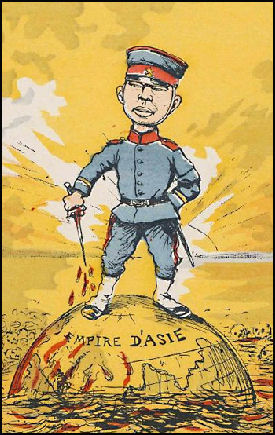obtained through Japanese delegations in China, as
evidence of Russian and English pressure on China
vis-a-vis Mongolia and Tibet, respectively, Japanese
writer Hatanu begins to make the case for a Japan-
centric Asia Alliance.//
Russian, Chinese and Mongolian diplomats signing the treaty
of Kahta in 1915.
On 17 July 1912, the following telegram came from
Shanghai:
The Russian ambassador in Peking submitted this threatening
letter to
the Chinese government:
1.The secret agreement between the Russian government and
the Urga
(Ulan Bator/Mongolia) government should be approved;
2.Mongolia will only borrow money from the Russian state
when it
borrows money for its provisions from elsewhere;
3.For the Russian state, permission must be given for it to
act with
complete freedom internally in Mongolia;
4.The Chinese government must not hinder in any way the rail
line that
will be built from St. Petersburg to Urga.
Here is a blatantly threatening demand! Since the time it was made, 3
months have
passed (the time of the publication of the book). I can say
that so far the Russian government
has taken a definitive stance vis-a-vis
its demands on this matter. In truth, the issue of dividing up China
continues
with absolute feverishness.
The secret agreement signed between Russia and Mongolia is
the
lifeline of these matter.
The following telegram came from Peking on 12 November:
1.The Chinese government should approve the preference for
the
rail line that will run from Urga (Ulan Bator) to Kahta.
2.The aforementioned government will approve these matters:
1) there
will be no soldiers in Mongolia
2) Chinese will not be sent to Mongolia
3) Mongolia will be seen as an independent state.
3. In the event that the Chinese government entrusts the
administration
of Mongolia to a special minister then this individual must be
jointly
appointed by the Chinese and Russian governments.
4. The Russian consuls will have preference for advancing
matters about
Mongolia in the Chinese government.
5. In the event that the Chinese government wants to make an
initiative
in Mongolia, it will seek the permission of Russia.


On 30 August 1912, the English ambassador in Peking
served up the following warning on the Chinese
government:
1.The people of Tibet will have sovereignty and freedom with
regard to
their internal affairs. And
the Chines government will in no way
interfere in the internal affairs of
Tibet.
2.The Chinese government may have an official in the Tibet
capital
Lhasa but only on the condition that this official has the rank of
advisor
on foreign affairs.
3.The Chinese government may have a very limited number of
soldiers in Tibet.
4.As of this moment, the Chinese government may not send its
customary number of officials to Tibet.
5.As of now, the India caravan road that passes through
Tibet is
closed to Chinese.

Western view of Japan in the early 20th century.
There
is a Need for an Alliance Among All
Asians
In a recently published work, one of today’s great Japanese
scholars,
Sochia, says that: “Saigu was one of Japan’s most famous and esteemed
Samarai heroes. He was one of the
founders of today’s administrative
state and one of our greatest men. Besides being a great genius trusted
by the Japanese, Saigu
was also a great thinker. Forty years
ago, Saigu
felt the need to take a united defensive stand against all the
governments
in America and Europe. He
recommended that all the Far Eastern
government agree on an alliance and made
an initiative in this regard."
What a great idea! In
other words, at that time Saigu saw that as long
as such an alliance was not
agreed to, Japan would not feel comfortable.
There can be no doubt that an Asian alliance would grant a
lifetime of
peace to all Asians and bring great benefits for Japan. Certainly, all
Asians, especially those who think about
their country, would approve
of an Asian alliance without hesitation and, in
fact, embrace it
wholeheartedly.
A Chinese doctor, Sin Hi Çin, was enthusiastic about a
China-Japan
alliance. He said that: “Every state must have allies, beside relying on
its own
resources with regard to foreign policy. In order to determine
our own foreign
policy we should take the state of Japan into
consideration. With regard to Japan occupying Manchuria, our
own
capital of Peking is close by so in the event that Japan is thinking of
occupying Peking, as well, it will have no difficulty in doing so.
In a very short time, Japan can send an abundant military
force to
China. No other state can compete with such a swift transport.
If, in fact, Japan takes such an action, other states will
do the same thing.
If we look at the
situation from this perspective it is evident that for the
Chinese have very
sincere relations with the Japanese.
For us we have no problem with anyone following American
policy or
English policy, but the soundest policy is association with Japan
because
Japan is the state with the greatest material strength on the face of
the Earth.
//END of PART II//

Hiç yorum yok:
Yorum Gönder